US Senators Urge EU To Designate IRGC As Terror Organization
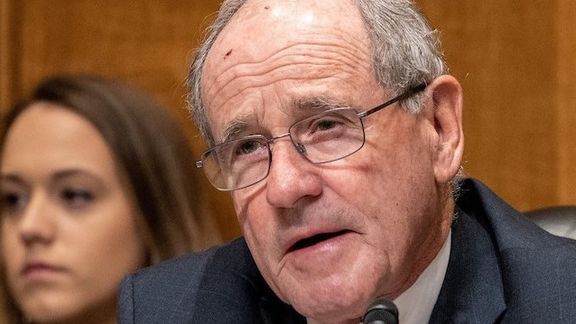
A group of US Republican senators has urged the European Union to designate Iran's Islamic Revolutionary Guard Corps (IRGC) a terrorist organization.

A group of US Republican senators has urged the European Union to designate Iran's Islamic Revolutionary Guard Corps (IRGC) a terrorist organization.
In a letter to EU Foreign Policy Chief Josep Borrell on Wednesday, 12 Republican senators led by James Risch (R., Idaho) said: "The IRGC clearly presents a threat to the EU and our collective security."
They further added that "it is long past time to cut off its resources before the next tragedy strikes", referring to attacks the organization has committed overseas, including the high profile attempted murder of author Salman Rushdie during a speaking engagement in the US.
The regime vehemently denies responsibility though said Rushdie had crossed a "red line" against Islam, tacitly approving of the incident which left him with life changing injuries.
According to a copy of the letter exclusively obtained by the Washington Free Beacon, Republicans say an EU "designation will cripple the IRGC's ability to promote terrorism and will make the world safer for Americans and Europeans alike".
The European Parliament overwhelmingly passed a resolution on January 19 calling on the EU and member states to designate the IRGC, however, several states including Germany fear designation will close the window of diplomacy regarding Iran's nuclear program may be closed.
The United States designated the IRGC as a global terrorist organization in 2019. It has carried out multiple cyber attacks and threats to the lives of Iranians abroad, including staff at Iran International based in the UK.
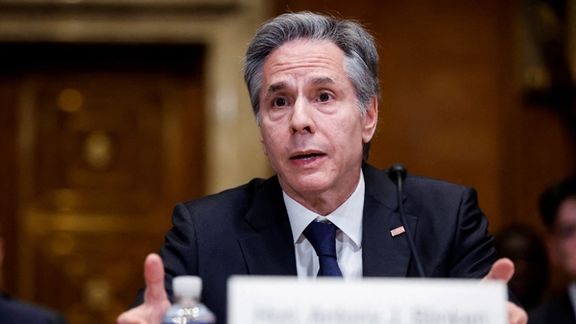
Pressure is mounting on the Biden administration to take harsher action on Iran as senators claim Iran’s oil wealth is helping fund Russia’s war on Ukraine.
At a review of the 2024 State Department Budget Request on Wednesday, Republican Senator Ted Cruz called the Biden administration “weak”, claiming its weakness on Iran is indirectly supporting Russia’s war efforts, in addition to boosting its nuclear capacity.
In a scathing attack, Cruz told Secretary of State Antony Blinken a walking back of the previous administration’s oil sanctions on Iran has led to empowering the regime's nuclear program and helped it support Russia’s military capacity through drone sales.
“I'm deeply concerned, however, that no matter how much you may want to help Ukraine there is something the Biden administration wants more, which is to re-enter a nuclear agreement with Iran,” he said.
“This administration has shown weakness on Iran since day one, and continues to do so. Just in the last few weeks there have been reports that you again waived congressional sanctions to allow Iraq to move money to the Central Bank of Iran, which the Ayatollah uses for terrorism, for ballistic missile development, and nuclear weapons work.”
The outspoken Senator went on to discuss the oil revenues which Iran is capitalizing on in addition to claiming that Russia’s use of Iranian oil tankers violates US energy sanctions.
“You've allowed that ghost fleet to grow dramatically,” Cruz said, claiming the number of tankers Iran was using at the start of the administration has risen from 70 to 300.
“The administration [has] allowed Iran to restore its energy exports, getting above one million barrels a day, which is funding the regime and funding the war on Ukraine.”
Last month was the highest oil exports Iran has had since 2018, not only great news for a beleaguered Iranian economy, but a boost to Russia which is now using an enormous Iranian fleet to bypass international sanctions.
Iranian oil exports started hitting new highs in the last two months of 2022 despite US sanctions, with higher shipments to China and Venezuela, countries bypassing international sanctions.
Tehran's oil exports were limited under former President Donald Trump when in 2018 he exited a 2015 nuclear accord and reimposed sanctions aimed at curbing oil exports and the associated revenue to Iran's government.
However, exports have risen during the term of his successor President Joe Biden, who had sought to revive the nuclear deal, and hit the highest since 2019 on some estimates. This comes despite headwinds such as a stall in those talks and competition from discounted Russian crude.
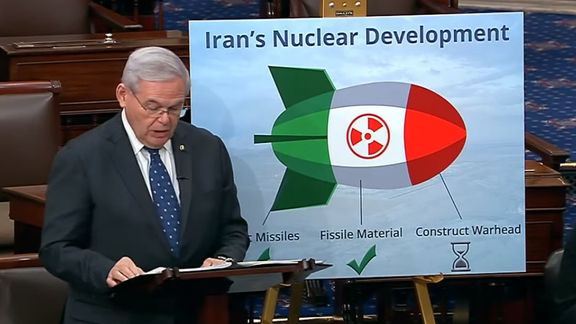
Energy consultant SVB International said Iran's crude exports in December averaged 1.137 million barrels per day, up 42,000 bpd from November and the highest 2022 figure SVB has reported based on estimates given earlier.
Blinken sheepishly defended the administration’s position, standing by the desire to return to the nuclear deal, known as JCPOA, talks which broke down last year after Iranian intransigence.
He said the US is “actively and aggressively working to break up” the alliance between Russia and Iran, claiming there are moves underway to reimpose the oil sanctions. Though the administration has imposed sanctions across Iran’s UAV network, which it is supplying to Russia for its invasion on Ukraine, a position the regime firmly denies, it is no nearer quelling the million barrels of oil Iran is selling which in turn, funds its global network of terror.
“We’re working every day to enforce the existing sanctions on Iran even as we're looking at imposing new ones,” said Blinken, though Cruz refuted the claims, accusing him of it being a simple political decision not to enforce the oil sanctions.
Russia’s support for Iran’s nuclear program was also a major point of contention, Cruz citing President Vladimir Zolensky’s claims that Russia is compensating Iran for weapons through nuclear cooperation. “Under this administration, you have allowed Iran to get to the brink of a nuclear weapon,” Cruz blasted, while Blinken blamed the failure of nuclear talks on Iran’s pulling out.
Senator Bob Menendez (D-NJ), Chair of the Senate Foreign Relations Committee, signaled the exasperation felt among Republicans and some Democrats at the lack of action from the Democrat administration to curb Iran’s growth. Rather than calling on a return to the JCPOA, the sentiment is that the moment has long passed.
“The Europeans have not joined us in multilateralizing our sanctions which at this time to Iran would have a huge consequence,” Menendez said. “It's time to come to the conclusion that we want Iran to move in a different course, so others have to join us as well.”
His sentiments were echoed by Senator James E. Risch, who, with Menendez, recently met with the International Atomic Energy Agency to discuss the matter of Iran.
Concurring, Risch added: “We need to encourage our European allies to join us in what we're trying to do as far as Iran is concerned.”
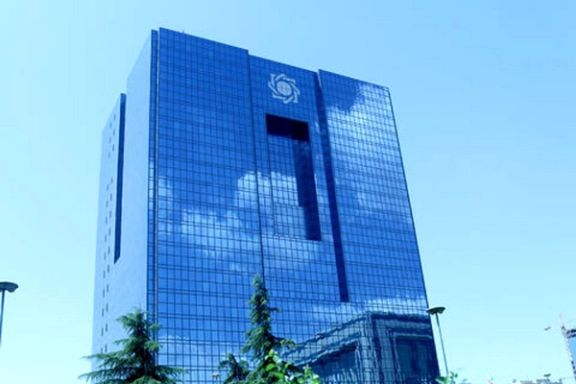
A federal judge in New York ordered Iran's central bank and a European intermediary to pay out $1.68 billion to family members of troops killed in the 1983 bombing of the US Marine Corps barracks in Lebanon.
US District Judge Loretta Preska said a 2019 federal law stripped Bank Markazi, the Iran central bank, of sovereign immunity from the lawsuit, which sought to enforce a judgment against Iran for providing material support to the attackers.
The lawsuit also names Luxembourg-based Clearstream Banking SA, which is holding the assets in a client account. Clearstream parent company Deutsche Boerse AG DB1Gn.DE said on Wednesday that it is considering appealing against the decision.
Clearstream will "weigh all relevant interests and responsibilities" and comply with its legal and regulatory obligations in handling the funds, Deutsche Boerse said.
The Oct. 23, 1983, bombing at the Marine Corps barracks killed 241 US service members.
Victims and their families won a $2.65 billion judgment against Iran in federal court in 2007 over the attack.
Six years later, they sought to seize bond proceeds allegedly owned by Bank Markazi and processed by Clearstream to partially satisfy the court judgment.
Bank Markazi has argued that the lawsuit was not allowed under the Foreign Sovereign Immunities Act (FSIA), which generally shields foreign governments from liability in US courts.
In January 2020, the US Supreme Court overturned a lower court ruling in the families' favor, and ordered the case to be reconsidered in light of a new law, adopted a month earlier as part of the National Defense Authorization Act.
Preska said the 2019 law authorizes US courts to allow the seizure of assets held outside the country to satisfy judgments against Iran in terrorism cases, "notwithstanding" other laws such as FSIA that would grant immunity.
A Luxembourg court in 2021 ordered Clearstream not to move the funds until a court in that country recognizes the US ruling. Clearstream has appealed that decision.
Reporting by Reuters
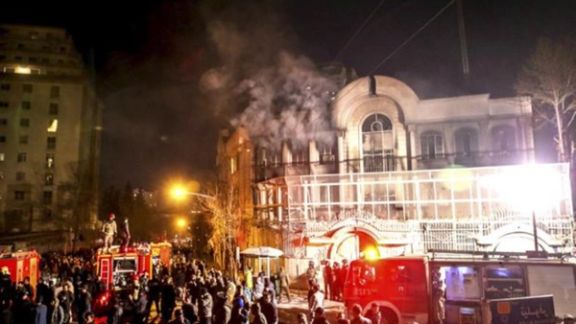
Iran’s and Saudi Arabia’s foreign ministers have agreed to meet soon to discuss the reopening of embassies under a deal earlier this month to restore ties.
Diplomatic relations were severed in January 2016 after pro-regime mobs attacked the Saudi embassy in Tehran following the execution of a Shiite cleric in Saudi Arabia. Years of hostility followed that had threatened stability and security in the Persian Gulf and the Middle East.
Saudi Foreign Minister Prince Faisal bin Farhan Al Saud and his Iranian counterpart Hossein Amir-Abdollahian spoke by phone to mark the occasion of the Muslim holy month of Ramadan, Saudi state news agency SPA said.
Amir-Abdollahian emphasized during the call Iran's readiness to strengthen relations, Iran's official news agency IRNA reported.
The deal between the regional powers, Sunni Muslim Saudi Arabia and long-time rival Shi'ite Iran, brokered by China, was announced March 10 after previously undisclosed talks in Beijing between top security officials from the two countries.
Analysts say both sides stand to benefit from de-escalation, as Iran seeks to undercut US efforts to isolate it in the region and Saudi Arabia tries to focus on economic development.
The kingdom also has blamed Iran for missile and drone attacks on its oil facilities in 2019 as well as attacks on tankers in Gulf waters. Iran denied those allegations.
Yemen’s Iran-aligned Houthi movement has also carried out cross-border missile and drone attacks into Saudi Arabia, which leads a coalition fighting the Houthis, and in 2022 extended the strikes to the United Arab Emirates.
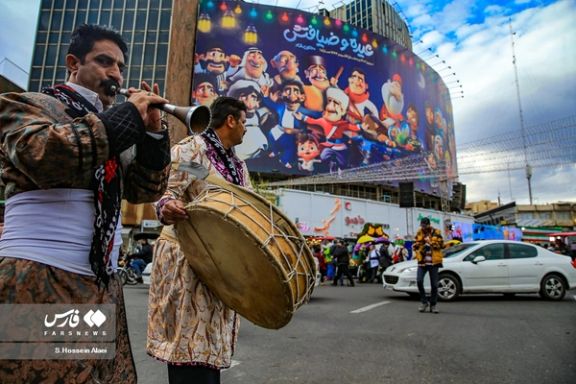
On the first day of the Iranian new year Media in Iran highlighted pessimism about the future, warning about the worsening political and economic situation.
Economic analyst Morteza Afghah told centrist news website Entekhab that tensions in Iran's domestic politics will escalate if the government fails to solve the country's economic problems and eliminate the impact of sanctions on the economy.
Afghah further argued that without resolving Iran's nuclear dispute with world powers and securing the lifting of US sanctions, back-breaking inflation in Iran will continue.
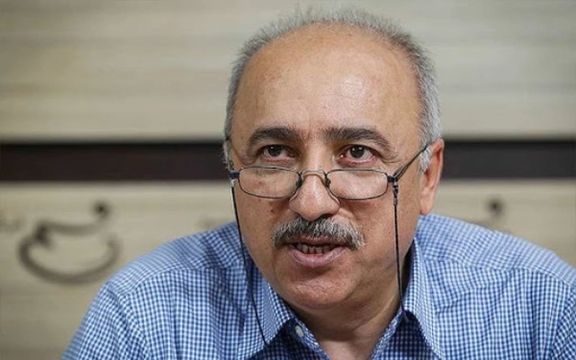
Talks with the West to revive the 2015 nuclear accord known as the JCPOA came to a deadlock last September.
Iran is experiencing an annual inflation rate of more than 50 percent for the second year in a row, with food prices rising between 70-100 percent.
The economist also argued that government officials do not realize how far their legitimacy has declined and people no longer believe their promises and statements. He added that the government expects the improvement in the ties with Saudi Arabia to bring about hope in the future of the economy, but without tackling the issue of the JCPOA and reducing regional tensions cannot solve all of the country's problems.
Meanwhile, in an interview with ILNA, conservative political activist Hossein Kanani-Moqaddam asked, "Why the government can negotiate with the enemies, but it is not prepared to hold dialogue with its own citizens?" Highlighting some of Iran's domestic and international political problems, Kanani called for negotiations between the government and political groups to put an end to the worsening impasse as almost all groups except ultraconservatives have been barred from candidacy in parliamentary and presidential elections.
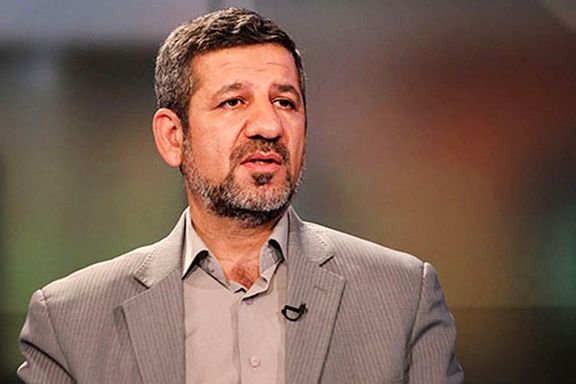
Kanani-Moqaddam further stressed the need for national reconciliation, which would bring various orientations to the forefront of political activity in Iran. "Political groups and organizations should be able to discuss problems with state officials and the people…as a way of addressing major problems." He also called for boosting political participation and "religious democracy" in Iran.
A report in moderate Rouydad24 website quoted Yahya Ebrahimi, a member of parliament, as saying that if lawmakers had been allowed to impeach some minister, the government would have better realized that the country was in a critical situation.
The remark highlighted complaints by many lawmakers during the past year about parliament Speaker Mohammad Bagher Ghalibaf preventing impeachment motions.
Ebrahimi warned that the political and economic situation in Iran is likely to be worsen in the coming months. The low-income strata of the society are going to suffer more than others as "wage-earners live under the poverty line as we have only two economic classes in Iran: The rich and the poor."
Ebrahimi further charged that the Iranian government has left the people to their own devices and is not doing anything to improve the situation. He added that "The current economic team is an insult to the nation's intelligence."
Ebrahimi warned that the social implication of this situation is far dangerous than its economic consequences. Students are abandoning schools, and cases of drug addiction and delinquency are on the rise.” Officials should be held accountable when impoverished people take to the streets in protest.

After a year when the rial lost about half its value and inflation surpassed 50 percent, the Islamic Republic decided to raise minimum wage by just 27 percent to about $100 to $110 a month.
The minimum wage has increased in rials but in comparison to the dollar, which was about 260,000 rials exactly a year ago and is now about 500,000, the workers lost a lot of purchasing power.
The minimum monthly salary rose from 41,790,000 rials to 5,308,000 rials (about $100 to $110) for the current Iranian year, which started on Tuesday, March 21. The minimum needed for an average family to simply survive is about $310 to $390 a month.
Iran has one of the lowest minimum wages in the world, but wages were increasing from 20 years ago to about 10 years ago when the minimum wage hit a record high of about $275 a month in 2010. This was when the United Nations Security Council began imposing economic sanctions to force Tehran to roll back its nuclear program.
In January 2023, minimum wages in the EU member states ranged from $410 per month in Bulgaria to $2,500 per month in Luxembourg.
Iranian workers were earning close to $300 a month before the United States imposed sanctions in 2018, which pushed Iran’s currency almost ninefold lower, creating inflation that wages have not kept up with.
The 27-percent increase, on the backdrop of rising prices -- especially foodstuff with 80 to 100 percent more expensive than a12 months ago – would likely lead to more labor protests and strikes this year, something that was already taking place regularly throughout the previous year. Rising prices and economic hardship have led to repeated labor strikes and nationwide protests since 2017, even before the imposition of US sanctions.
In his televised address early Tuesday, President Ebrahim Raisi claimed achievements for his administration, saying that sanctions on Iran failed, macroeconomic indicators improved, and thirdly, the public trust of the people in the regime increased. Several local media outlets dismissed his claims.
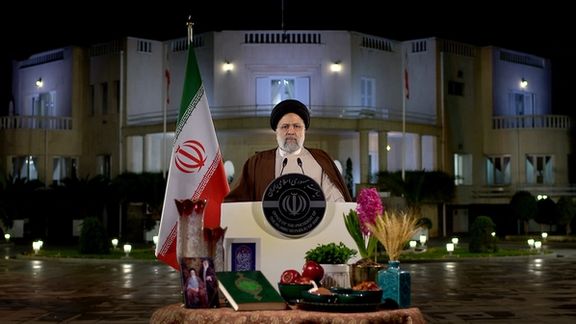
In addition to round after round of US sanctions on Iran, several European countries as well as international organizations adopted resolutions or punitive measures against the Islamic Republic. Countries such as Iraq that used to be a source of foreign currency income for Iran started cooperation with the United States, making it difficult for the regime to launder its oil revenues and funnel them back. Moreover, the negotiations to revive the 2015 nuclear deal – the JCPOA – collapsed indefinitely and the global call not to restore the accord is getting stronger.
Sanctions on the regime are actually working quite well despite the claims of more crude oil exports, as Tehran does not seem to be receiving any considerable sums in hard currencies. According to an article on Farazdaily published on Sunday, the government has signed $100 billion worth of interim investment deals in the form of memoranda of cooperation – the largest of which is a $40 billion one with Russia’s Gazprom -- but no binding contracts have been signed.
Oil Minister Mohammad Javad Oji insists that about $20 billion worth of oil and gas contracts were finalized in the previous Iranian year, but the catch is that most of the finalized contracts were signed with Iranian companies, which means no foreign investment and transfer of technology will materialize, the article added. There is no official information about any foreign firm that has agreed to invest in Iran and jeopardize relations with the US.
Iran’s centrally controlled economy is inefficient and not conducive to foreign investments, with high reliance on oil exports. With no legal and simple way to access its revenues and frozen assets, the Islamic Republic’s economic indicators are also in disarray, contrary to what President Raisi claimed.
According to a recent report, Iran’s misery index rose from 19.3 percent in 2018 to 49.4 percent in 2022, with estimates saying that the figure hit 56 percent by March 2023, which is the highest level in the past 27 years. The index is an economic indicator to determine how the average citizen is doing economically and is calculated by adding the seasonally adjusted unemployment rate to the annual inflation rate.
In the previous Iranian year, the country saw its boldest uprising against the Islamic Republic since its establishment in 1979. The antiregime protests that started in September 2022 flare up occasionally and could explode again under financial pressures.